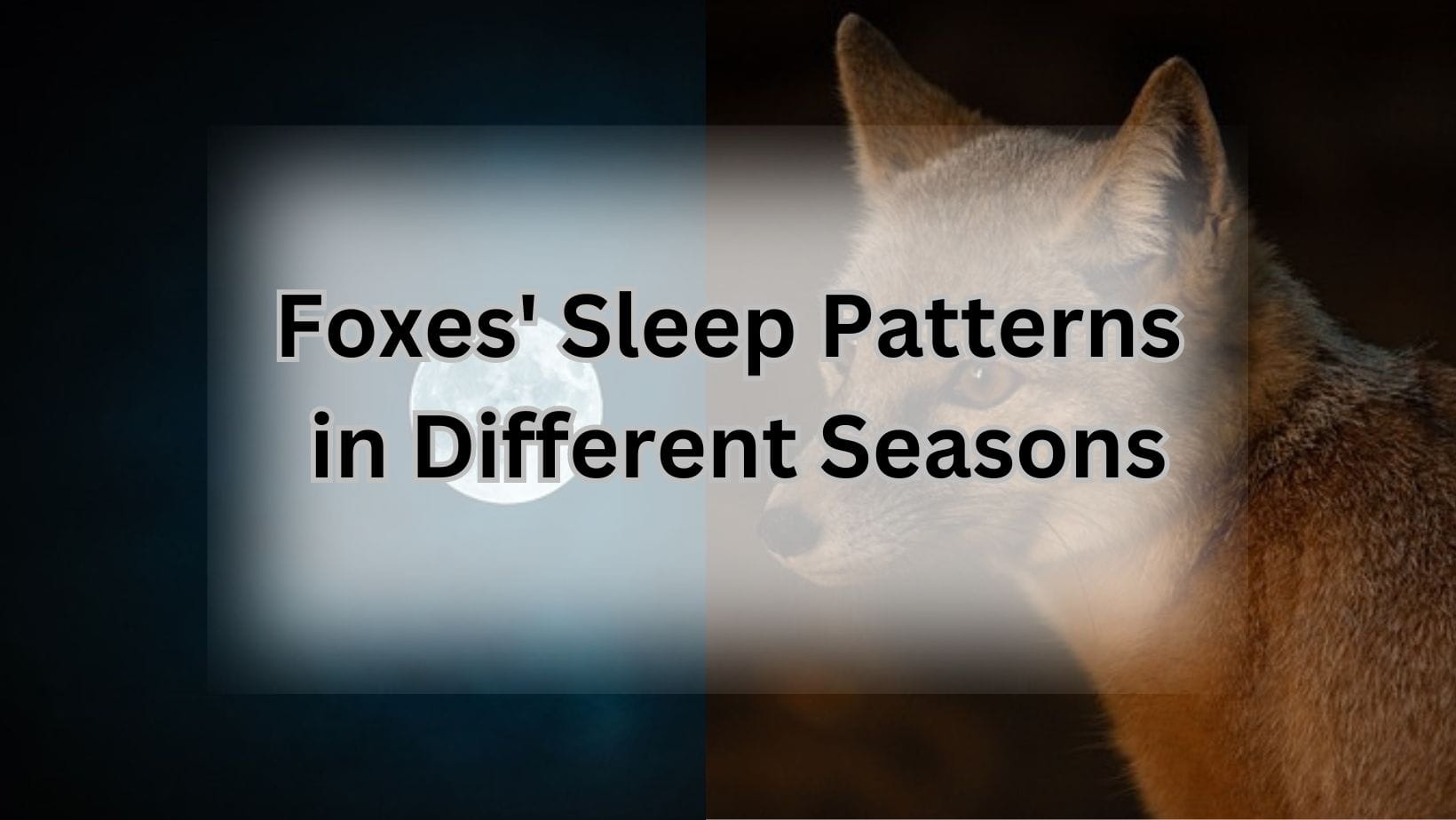Do Foxes Sleep at Night? Discover the Truth Here!

Why Do Foxes Sleep at Night
Well, my fellow Canid Wild Life Lover, have you ever wondered why those cunning foxes prefer to catch some Z’s when the moon is high in the sky? It turns out that foxes are nocturnal creatures, meaning they are most active during the night. Sleeping during the day helps them conserve energy for their nightly adventures of hunting and exploring. So, if you want to learn more about the fascinating nocturnal habits of these sly creatures, keep on reading!
The Sleeping Habits of Foxes
Do foxes sleep at night? Well, let me tell you about the nocturnal habits of these cunning creatures. Foxes are known to be active during the night, making them primarily nocturnal animals. However, their sleeping patterns can vary based on various factors.
Denning Behavior
Foxes are known to be denning animals, meaning they have specific den sites where they rest and sleep. These dens provide them with a safe and secure place to catch some z’s. Foxes are known to be quite resourceful when it comes to finding the perfect den, whether it’s in a burrow, under a fallen tree, or even in an abandoned building.
Duration of Sleep
While foxes are primarily active at night, they do not sleep the entire time. On average, foxes sleep for about 8-9 hours a day, with most of their sleep occurring during the day. They are known to take short naps throughout the night, especially after a successful hunt or when they need to conserve energy.
Factors Influencing Sleep Patterns
Various factors can influence the sleep patterns of foxes. For example, during the breeding season, foxes may sleep less as they are busy searching for a mate and caring for their young. Additionally, environmental factors such as temperature and food availability can also impact how much and when foxes sleep.
So, next time you see a fox darting across a moonlit field, remember that these clever creatures are just taking a break from their nocturnal adventures to catch some shut-eye in their cozy den.
Foxes’ Preferred Sleeping Locations
Do foxes sleep at night? Absolutely! Foxes are nocturnal creatures, meaning they are most active during the night and sleep during the day. Let’s dive into the preferred sleeping locations of these cunning canids.
3.1. Importance of Shelter
When it comes to catching some Z’s, foxes prefer to find shelter in dens or burrows. These cozy hideaways provide protection from predators and harsh weather conditions, allowing foxes to rest peacefully.
3.2. Natural vs. Man-Made Dens
Foxes are known for their resourcefulness when it comes to finding a place to sleep. While some foxes may choose to make their own dens by digging burrows in the ground, others may repurpose abandoned burrows or even take over the dens of other animals.
3.3. Camouflage and Safety
When selecting a sleeping spot, foxes prioritize safety and camouflage. They often choose locations that blend in with their surroundings, such as dense vegetation or wooded areas. This helps them remain hidden from potential threats while they catch some shut-eye.
Foxes’ Circadian Rhythms
Do foxes sleep at night? Well, let’s dive into the fascinating world of foxes’ circadian rhythms to find out! These cunning creatures have some interesting habits when it comes to catching their z’s.
Biological Clocks
Just like us humans, foxes have their own internal biological clocks that regulate their sleep patterns. Foxes are primarily nocturnal animals, meaning they are most active during the night and tend to sleep during the day. This behavior is deeply ingrained in their DNA, allowing them to hunt and thrive in the cover of darkness.
Seasonal Variations
During the winter months, foxes may adjust their sleep patterns slightly due to the shorter days and longer nights. They may be more active during the day to take advantage of the limited daylight hours for hunting. However, come summertime, they revert back to their nocturnal ways.
Impact of Environmental Factors
Environmental factors can also play a role in when and where foxes choose to sleep. Foxes typically seek out safe and secure dens to catch some shut-eye, especially during the daytime when they are more vulnerable to predators. These dens provide a cozy and protected environment for them to rest and recharge for their nighttime adventures.
So, the next time you catch a glimpse of a fox darting across a moonlit field, remember that these clever creatures are simply following their natural instincts when it comes to sleeping at night. Their circadian rhythms are finely tuned to the rhythms of the night, making them the stealthy hunters of the twilight hours.
Foxes’ Alertness During Sleep
Have you ever wondered how foxes manage to catch some z’s in the wild without becoming a midnight snack for predators? Let’s dive into the fascinating world of foxes’ sleep habits and their remarkable alertness during slumber.
5.1. Sensory Awareness
Despite snoozing away in their cozy dens or hidden spots, foxes remain highly attuned to their surroundings. Their acute senses of hearing and smell help them stay vigilant even while catching some shut-eye. This sensory awareness allows them to quickly detect any potential threats lurking nearby.
5.2. Vigilance Against Threats
Foxes are known for their cautious nature, especially when it comes to their safety. Even during sleep, they maintain a level of vigilance to ensure they can react swiftly to any danger that may approach. This innate instinct helps them survive in the wild and avoid falling prey to larger predators.
5.3. Quick Response to Danger
If a fox senses danger while sleeping, it can spring into action within seconds. Their reflexes are finely tuned to react promptly to threats, allowing them to escape or defend themselves effectively. This quick response to danger is a crucial survival skill that foxes have honed over generations in the wild.
Foxes’ Social Sleeping Behaviors
Do foxes sleep at night? Well, let’s dive into the fascinating world of foxes’ social sleeping behaviors to find out! These cunning creatures have some interesting habits when it comes to catching their Z’s.
Family Units
When it comes to snoozing, foxes are known to stick together in family units. They often share dens with their young or mates, creating a cozy sleeping arrangement. This not only helps them stay warm but also strengthens their family bonds. Imagine having a slumber party with your loved ones every night!
Group Dynamics
While foxes are typically solitary animals, they sometimes come together in small groups to sleep. This behavior is more common during the colder months when they need to huddle up for warmth. It’s like having a sleepover with your buddies to stay toasty during the chilly nights!
Communication While Resting
Even while catching some shut-eye, foxes are not completely silent. They communicate with each other through various vocalizations, such as barks, whines, and growls. This helps them stay connected and alert, even in dreamland. It’s like having a sleep talk with your roommates without actually waking up!
Foxes’ Sleep Patterns in Different Seasons
Have you ever wondered if foxes sleep at night like we do? Let’s dive into the fascinating world of fox sleep patterns and find out how these cunning creatures catch their Z’s in different seasons.
7.1. Winter Hibernation
When the winter chill sets in, foxes don’t hit the snooze button – they go into full hibernation mode! These sly animals find a cozy den to curl up in and catch some much-needed shut-eye during the cold months. It’s like they’re in their own little fluffy dreamland, waiting for the warmth of spring to wake them up.
7.2. Summer Activity Levels
As the sun shines bright and the days get longer, foxes become more active at night. They roam their territories, hunt for food, and play under the moonlight. So, while you’re counting sheep, these nocturnal creatures are out and about, living their best fox lives.
7.3. Behavioral Changes in Spring and Fall
During the transitional seasons of spring and fall, foxes’ sleep patterns can vary. They may take shorter naps during the day and be more active at dusk and dawn. It’s like they’re adjusting their sleep schedule to match the changing daylight hours, proving that foxes are truly adaptable creatures of the wild.
Foxes’ Dreaming Behavior
Do foxes sleep at night? The answer is yes, they do! But have you ever wondered if foxes dream while they snooze? Let’s dive into the fascinating world of foxes’ dreaming behavior.
8.1. REM Sleep
Just like humans, foxes experience REM (rapid eye movement) sleep, which is the stage of sleep associated with dreaming. During REM sleep, their brains are active, and their eyes move rapidly beneath their eyelids. So, it’s safe to say that foxes do dream while they catch some Z’s.
8.2. Dreaming Studies
While there haven’t been specific studies on foxes’ dreams, research on other animals suggests that they likely have dream experiences. So, it’s not far-fetched to imagine foxes chasing rabbits or exploring the forest in their dreams.
8.3. Theories on Foxes’ Dreams
Some theories suggest that animals dream about their daily experiences, which could mean that foxes dream about hunting for food or interacting with other animals. Others believe that dreams help animals process emotions and memories, just like humans do.
So, the next time you see a fox curled up in its den at night, remember that it might be off on a dreamy adventure in its sleep. Who knows, maybe it’s chasing a squirrel or playing in a field of wildflowers in its dreams!
Foxes’ Health Benefits of Sleep
Have you ever wondered why foxes sleep at night? Well, let me tell you, my fellow Canid Wild Life Lover, that sleep is crucial for the health and well-being of these cunning creatures. Let’s dive into the fascinating world of foxes’ sleep habits and explore the benefits it brings to their lives.
9.1. Physical Restoration
When the sun sets and darkness envelops the land, foxes curl up in their cozy dens for a good night’s sleep. During this time, their bodies undergo a process of physical restoration, repairing any wear and tear from their daily activities. Just like us, foxes need their beauty sleep to recharge and rejuvenate.
9.2. Cognitive Function
As the night progresses, foxes enter different stages of sleep, including REM sleep, which is essential for cognitive function. This deep sleep phase helps consolidate memories, process information, and maintain optimal brain health. So, the next time you see a fox snoozing under the moonlight, remember that it’s not just resting, but also sharpening its wits.
9.3. Immune System Support
While you may be counting sheep, foxes are boosting their immune systems during their nightly slumber. Sleep plays a vital role in regulating the immune response, helping foxes fight off infections and stay healthy. So, the next time you spot a fox napping in the shadows, know that it’s not just a lazy creature but a smart one investing in its well-being.
Human Interaction and Foxes’ Sleep
Urban Foxes vs. Rural Foxes
When it comes to the nocturnal habits of foxes, urban foxes and rural foxes have different sleep patterns. Urban foxes, being accustomed to human presence and city lights, may adjust their sleep schedule to avoid busy streets and noisy neighborhoods. On the other hand, rural foxes may have more freedom to roam and sleep undisturbed in their natural habitats.
Impact of Human Activities
Human activities can greatly affect the sleeping habits of wild foxes. Bright city lights, loud noises, and urban development can disrupt their natural sleep patterns, causing them to be more active at night when they should be resting. Conservation efforts are crucial to minimize these disruptions and allow foxes to sleep peacefully.
Conservation Efforts and Sleep Patterns
Conservation efforts play a vital role in preserving the sleep patterns of wild foxes. By protecting their habitats, reducing human disturbances, and raising awareness about the importance of wildlife conservation, we can ensure that foxes have a safe environment to sleep at night. It’s essential to respect their natural behavior and give them the space they need to rest and recharge.
So, the next time you see a fox snoozing under the moonlight, remember that they too need their beauty sleep. Let’s work together to create a world where foxes can sleep peacefully at night, undisturbed by the hustle and bustle of human life. After all, a well-rested fox is a happy fox!






